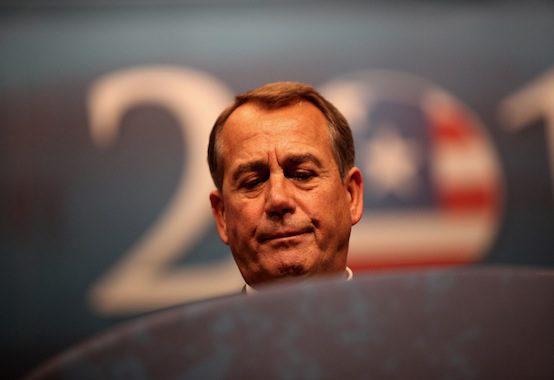The Agony of Boehner

There are two ways of looking at the failed coup attempt against House Speaker John Boehner, who overcame rumors and defections to reclaim the gavel. The most obvious is to note the end result, which in retrospect seemed inevitable.
After all, the Republican insurgents apparently did not identify a single challenger. They voted for a variety of candidates, including some who had left Congress, such as former Rep. Allen West, and some who had never served there, like Colin Powell and former comptroller general David Walker.
It’s not altogether clear that a single vote went to someone who was actually looking for the job, at least this time around.
Outgoing Rep. Jeff Landry, a Louisiana Republican who reportedly blamed Boehner for his November defeat, recruited Ron Meyer, a 23-year-old activist, to help stir up grassroots conservatives outside Congress against the speaker on Twitter. Landry told Breitbart News that Boehner was as good as gone.
The departing congressman similarly burned Meyer. “I have confirmed with a group of Congressmen that Speaker Boehner will not be elected Speaker tomorrow,” the young man said in an email to reporters the day before the House vote. “He will either resign or be forced out tomorrow.”
When that didn’t happen, #FireBoehner quickly descended into #fail. The entire strategy was predicated on denying Boehner victory on the first ballot and hoping someone—maybe House Majority Leader Eric Cantor?—would emerge to topple the wounded speaker on the second.
But beneath the surface of this Keystone Cops-like performance, there is another way to look at this botched putsch: despite the lack of a challenger or sound strategy, the insurgents came surprisingly close to pulling it off.
As National Review’s Robert Costa and other close observers reported, the number of anti-Boehner votes and abstentions briefly spiked to 17—the exact number necessary to force a second ballot. It just didn’t stay there long.
Some Republicans considering a vote against Boehner were only willing to strike if there was a reasonable guarantee of success. If you’re going to set out to kill the king, he had better wind up dead. There were also probably a few that preferred to send their speaker a message rather than actually vote him out of office.
Either way, Boehner endured the highest number of defections of any speaker in the last 22 years. He did worse than Newt Gingrich, in both the raw number of dissenting members of his party and percentage of caucus vote, when he was reelected speaker under similar political circumstances.
Recently, only Nancy Pelosi had a poorer showing when she was deserted by 20 Democrats in the speaker election in the previous Congress. But Pelosi was the minority party’s leader, a guaranteed loser, and her party had just been pounded in the 2010 elections. Moderate and conservative Democrats had been defeated for simply voting for Pelosi for speaker, a mistake the few centrist survivors were unwilling to repeat. It was a very different situation.
A 1997 attempt to depose Gingrich didn’t even get off the ground with the support of most of the leadership team, including House Majority Leader Dick Armey and House Majority Whip Tom DeLay. Boehner, then chairman of the House Republican Conference, denied any knowledge of the coup, though reports indicated he was involved.
“In scheming to be rid of House Speaker Gingrich, DeLay and his co-conspirators showed all the talent for intrigue of Peter Sellers in his Pink Panther days,” James Carney wrote in Time. Then Florida Rep. Mark Foley, of all people, likened it to a “circular firing squad.” Back then, there were also “20 or more insurgents from the rank and file” secretly plotting.
This time around, the coup attempt was thrown together at the last minute with no alternative candidate, no leadership support, and a limited effort to whip disenchanted conservatives against the speaker. Cantor stoked the flames not just by opposing the bipartisan fiscal cliff deal, but by the way he came out against it—in front of the caucus before Boehner had taken a stand.
Remember, however, that four years transpired between Gingrich’s rebellion against House Minority Leader Bob Michel over the 1990 tax increase and when he signaled his intention to replace him.
Might this hurt the careers of the young committed conservatives who went through with the effort: Raul Labrador, Mick Mulvaney, and “quarterback” Justin Amash? Perhaps. But DeLay, Armey, and ultimately even Boehner survived the abortive coup against Gingrich.
The speaker’s election was a clear indication that Boehner does not have much margin for error. House Democrats are already threatening to force Boehner to get to a 218-vote majority without their help on some key legislation, a move that will increase both their bargaining power and the Republican insurgents’.
Embarrassments and miscues aside, it may have been the best possible outcome. The insurgents weren’t pushed into positions for which they were obviously unprepared and Boehner received a momentary reminder of his political mortality that will likely be remembered longer than an ill-fated hashtag.
W. James Antle III is editor of the Daily Caller News Foundation and a contributing editor to The American Conservative. Follow him on Twitter.
Comments